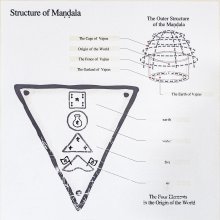Sharira, Śarīra, Sarīra, Sarira, Śārīra: 39 definitions
Introduction:
Sharira means something in Buddhism, Pali, Hinduism, Sanskrit, Jainism, Prakrit, the history of ancient India, Marathi, Hindi. If you want to know the exact meaning, history, etymology or English translation of this term then check out the descriptions on this page. Add your comment or reference to a book if you want to contribute to this summary article.
Sharira has 39 English definitions available.
The Sanskrit terms Śarīra and Śārīra can be transliterated into English as Sarira or Sharira, using the IAST transliteration scheme (?).
Images (photo gallery)
Languages of India and abroad
Sanskrit dictionary
[Deutsch Wörterbuch]
Source: Cologne Digital Sanskrit Dictionaries: Böhtlingk and Roth Grosses Petersburger WörterbuchŚarīra (शरीर):—
--- OR ---
Śārīra (शारीर):—(von śarīra)
1) adj. (f. ī [Suśruta 2, 353, 11.] ā [Mahābhārata 14, 442]). a) beinern, knöchern: śalākā [Suśruta 2, 353, 11.] — b) körperlich, im Körper befindlich, aus dem Körper stammend (Gegens. mānasa) [Hemacandra’s Anekārthasaṃgraha 3, 608.] [Medinīkoṣa r. 224.] puruṣa [The Śatapathabrāhmaṇa 14, 5, 5, 1. 6, 9, 11. 7, 1, 12.] ātman [11, 4. 7, 1, 21. 2, 1.] [TAITT. Upakośā 2, 3. fgg.] [Bhāgavatapurāṇa 1, 5, 2.] vyādhi [Suśruta 1, 1, 9. 4, 7. 5, 7.] śalya [96, 8.] vraṇa [2,1,4.] [Oxforder Handschriften 314,a,5. 316,b,5.] karman [Manu’s Gesetzbuch 8, 273. 12, 7.] [Bhagavadgītā 4, 21.] tapas [17, 14.] śauca [Manu’s Gesetzbuch 5, 110. 139.] daṇḍa [9, 236.] duḥkha [Spr. (II) 4209.] [Mahābhārata 3, 65.] ābādha [2, 223. 14, 442.] [Rāmāyaṇa Gorresio 2, 15, 16.] roga [Spr. 4945.] [Mārkāṇḍeyapurāṇa 37, 32. 35.] [Bhāgavatapurāṇa 3, 22, 37.] vyavasthā [Oxforder Handschriften 65,b,39. 66,a,11.] —
2) n. a) Leibesbeschaffenheit [Mahābhārata 15, 938.] [Varāhamihira’s Bṛhajjātaka S. 69, 3.] — b) ein Hauptstück in der Medicin: die Lehre vom Körper und seinen Theilen; ein Abschnitt dieser Disciplin [Suśruta 1, 8, 4. 11, 10. 310, 1. 313, 16.] bei [CARAKA] das vierte Buch. — c) faeces [Manu’s Gesetzbuch 11, 202.] diese Bed. ist wohl auch [Hemacandra’s Anekārthasaṃgraha] und [Medinīkoṣa] gemeint, wo vṛṣe wohl nur Fehler für viṣi ist.
--- OR ---
Sarira (सरिर):—(wie eben) n. das Wogende; Wassermasse, Fluth [Vājasaneyisaṃhitā 13, 42. 49. 53. 15, 4. 52. 17, 87. 38, 7.] [Taittirīyabrāhmaṇa 1, 2, 1, 3.] [Weber’s Indische Studien 8, 109.] = bahu [das 3, 1.] — Vgl. salila .
Sanskrit, also spelled संस्कृतम् (saṃskṛtam), is an ancient language of India commonly seen as the grandmother of the Indo-European language family (even English!). Closely allied with Prakrit and Pali, Sanskrit is more exhaustive in both grammar and terms and has the most extensive collection of literature in the world, greatly surpassing its sister-languages Greek and Latin.
See also (Relevant definitions)
Starts with (+150): Sariradhatu, Sariravant, Sharira-traya, Sharira-vijnana, Sharirabaddha, Sharirabandha, Sharirabandhaka, Sharirabandhena, Sharirabhaj, Sharirabhava, Sharirabheda, Sharirabhoga, Sharirabhrit, Sharirabhuta, Sharirabhyadhika, Sharirabrahmana, Sharirachinta, Shariraci Damati, Shariraci Dhagala, Shariraci Dhalapi.
Ends with (+76): Acyutasharira, Adhishthanasharira, Adhyatmasharira, Adisharira, Agamasharira, Akshatasharira, Akuncitasharira, Alpasharira, Amanushyasharira, Anamayasharira, Antahsharira, Anushthanasharira, Aparasharira, Apasharira, Aprakrita-sharira, Asharira, Asvasthasharira, Ativahikasharira, Audarikasharira, Ayasharira.
Full-text (+650): Shariram, Shariraka, Sthulasharira, Sharirakarshana, Khasharira, Antahsharira, Sharirasamskara, Sharirayoga, Sharirasthana, Sukshmasharira, Shariraja, Sharirabhaj, Karanasharira, Shariralakshana, Adhishthanasharira, Sharirayatra, Sharirajanman, Svasharira, Shariratulya, Shariragrahana.
Relevant text
Search found 159 books and stories containing Sharira, Śarīra, Sarīra, Sarira, Śārīra, Śārira, Sārīra, Sārīrā, Śarira, Sārira; (plurals include: Shariras, Śarīras, Sarīras, Sariras, Śārīras, Śāriras, Sārīras, Sārīrās, Śariras, Sāriras). You can also click to the full overview containing English textual excerpts. Below are direct links for the most relevant articles:
Philosophy of Charaka-samhita (by Asokan. G)
Body (śarīra) [in Charaka philosophy] < [Chapter 5 - The Complete Man]
Composite man (rāśi-puruṣa) < [Chapter 5 - The Complete Man]
The theory of three faults (tridoṣa-siddhānta) < [Chapter 3 - Fundamental Theories]
Manusmriti with the Commentary of Medhatithi (by Ganganatha Jha)
Verse 11.202 < [Section XXVI - Expiation for riding a Camel and other similar Offences]
Verse 11.229 < [Section XXX - Confession and Repentance]
Verse 8.273 < [Section XLI - Verbal Assault (Abuse and Defamation)]
Shrimad Bhagavad-gita (by Narayana Gosvami)
Verse 17.14 < [Chapter 17 - Śraddhā-traya-vibhāga-yoga]
Verse 4.21 < [Chapter 4 - Jñāna-Yoga (Yoga through Transcendental Knowledge)]
Verse 13.32 < [Chapter 13 - Prakṛti-puruṣa-vibhāga-yoga]
Cidgaganacandrika (study) (by S. Mahalakshmi)
Verse 117 [Karaṅgiṇi form of Śakti] < [Chapter 3 - Third Vimarśa]
Verse 87 [Śakterādya, Parināma, Prānā] < [Chapter 3 - Third Vimarśa]
Verse 158 [Prāṇā Haṃsa is Prathamaspanda] < [Chapter 3 - Third Vimarśa]
A History of Indian Philosophy Volume 3 (by Surendranath Dasgupta)
Part 15 - God in the Rāmānuja School < [Chapter XX - Philosophy of the Rāmānuja School of Thought]
Part 21 - Śaila Śrīnivāsa < [Chapter XX - Philosophy of the Rāmānuja School of Thought]
Part 2 - A General Idea of Nimbārka’s Philosophy < [Chapter XXI - The Nimbārka School of Philosophy]
Taittiriya Upanishad Bhashya Vartika (by R. Balasubramanian)
Verse 2.359 < [Book 2 - Brahmavallī]
Verse 2.283 < [Book 2 - Brahmavallī]
Verse 2.399 < [Book 2 - Brahmavallī]
Related products


